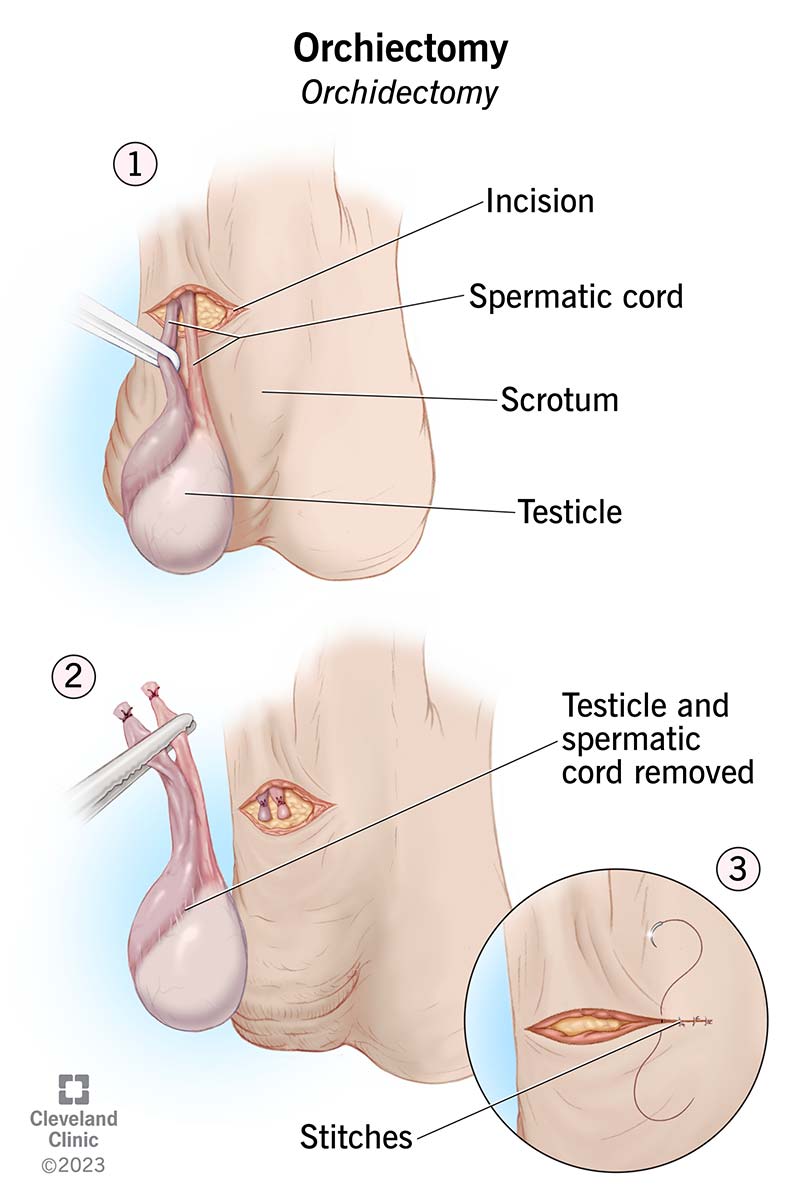An orchiectomy is a surgical procedure to remove one or both testicles. Providers use this procedure to treat and prevent testicular cancer as well as to treat male breast cancer and prostate cancer. Transgender women may choose to have an orchiectomy when transitioning from male to female. Orchiectomies usually don’t require an overnight hospital stay.

An orchiectomy (or orchidectomy) is a surgical procedure to remove one or both testicles. Testicles are two small organs that hang in a sac of skin (scrotum) below your penis. Testicles (or testes) make sperm and male hormones like testosterone.
Healthcare providers perform orchiectomies to treat or prevent testicular cancer, prostate cancer and male breast cancer. Transgender women may choose to have an orchiectomy when transitioning from male to female. Usually, an orchiectomy is an outpatient procedure, so you go home the same day.
Advertisement
Cleveland Clinic is a non-profit academic medical center. Advertising on our site helps support our mission. We do not endorse non-Cleveland Clinic products or services. Policy
Healthcare providers use orchiectomies to:
Providers perform orchiectomies at a surgical center or a hospital. Most commonly, they use general anesthesia (to put you to sleep for the procedure). You won’t feel pain during surgery.
Advertisement
Your healthcare provider cleans the area and makes an incision (cut). The location of the incision depends on the technique your healthcare provider uses. The incision may be in your pubic area (inguinal orchiectomy) or in your scrotum (simple orchiectomy). Your healthcare provider may remove:
If you choose to have a prosthetic testicle, your provider will place the new testicle inside your scrotum. The prosthetic testicle is filled with salt water (saline).
At the end of the procedure, your provider closes the incision with stitches. After the surgery, you’ll need to wait in the recovery room until you’re ready to leave. Most people go home the day of surgery.
Since you’re asleep under anesthesia for the procedure, you won’t feel pain. You may feel discomfort during the recovery period. Talk to your healthcare provider about pain medications and other ways to relieve discomfort in the days and weeks after an orchiectomy.
Usually, the entire procedure takes between 30 to 60 minutes.
You’ll need someone to drive you home after surgery. The entire recovery process usually takes several weeks. You’ll need to schedule a follow-up visit with your healthcare provider after the procedure. As you recover, you should:
Advertisement
For people with testicular cancer, orchiectomy is an effective treatment to remove the tumor and analyze the tissue for cancer. For breast and prostate cancer, it’s an effective treatment to lower hormone levels as part of a larger treatment strategy.
For many transgender people, an orchiectomy may be an important aspect of the transition process. It reduces the need for long-term feminizing hormone therapy. Hormone therapy for transgender women often includes drugs or supplements that lower androgen levels (androgen deprivation therapy or ADT) or increase estrogen. Although the risks of estrogen supplements are low, long-term use can lead to blood clots and other health problems.
A sudden decrease in hormones due to removing your testicles can have side effects. Talk to your healthcare provider about ways to manage these side effects.
As with any surgical procedure, the risks of an orchiectomy include bleeding and infection. You may have side effects like swelling and pain. Complications and side effects of an orchiectomy depend on the type of surgery you had.
Some of the side effects from orchiectomy result from a decrease in hormone levels (typically when both testicles are removed). While rare, a drop in testosterone and other male hormones can lead to:
People who have both testicles removed (a bilateral orchiectomy) can’t produce sperm. This procedure makes them infertile.
An orchiectomy can affect how you feel about yourself and how you feel about sex. It’s normal to have these types of emotions after surgery. Talk to your healthcare provider about the psychological side effects of surgery. They can recommend ways to help you cope.
It’s essential to make sure your incision heals completely before resuming physical activities, including sex. Healthcare providers usually recommend that you wait three to four weeks. Until then, you shouldn’t play sports, run or lift anything heavy. Ask your healthcare provider when you can get back to the activities you enjoy.
After an orchiectomy, call your healthcare provider right away if you:
If you’re having hot flashes, fatigue or problems with sexual function, call your healthcare provider. These symptoms can occur after a drop in hormone levels. Talk to your healthcare provider about taking hormone supplements, which may relieve these symptoms.
It could, but it doesn’t have to. Transgender people can opt to have this surgery, but it isn’t necessary for gender reassignment. The decision to have this or any other gender affirmation procedure is highly personal and unique to your situation.
A note from Cleveland Clinic
An orchiectomy is a procedure that removes one or both of your testicles due to cancer or as part of gender reassignment surgery. It’s normal to have questions about the surgery, no matter what the reason is for having it. Be sure to discuss the procedure with your healthcare provider so you know exactly what to expect. Your provider will go over the risks and benefits of the surgery as well as how you can best recover after surgery.
Last reviewed on 01/24/2024.
Learn more about the Health Library and our editorial process.
Advertisement
Cleveland Clinic is a non-profit academic medical center. Advertising on our site helps support our mission. We do not endorse non-Cleveland Clinic products or services. Policy